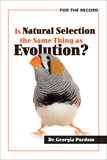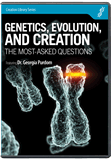News to Note, July 3, 2010
A weekly feature examining news from the biblical viewpoint
Moby-Leviathan, Homo tibetanus, mighty mice, and more!
This week:
- Moby-Leviathan
- Homo tibetanus
- Mighty mice
- Still . . . don’t tease a T. rex
- Perch on me
- And Don’t Miss . . .
Did you miss it? Catch last week’s News to Note or any other!
1. Leviathan Found - According to Broad Definition
Leviathan has at last been found—according to a broad definition of “Leviathan,” anyway.
2. Are Tibetans the Most Evolved Humans?
Are Tibetans the most evolved humans? Just what does that mean?
3. Mountain Mice Murine Equivalent of Tibetan Humans?
Are mountain mice the murine equivalent of Tibetan humans (see item )?
4. T.rex Taken Down a Notch
T. rex, you’ve just been taken down a notch.
5. Scientists Turning to Creation for Inspiration
Once again, scientists are turning to God’s creations for inspiration.
6. And Don’t Miss . . .
- Are pseudogenes evidence of evolution or important, functioning elements of life? A new study indicates that, evidence of evolution or not, they are indeed functioning elements of life. “[T]o have this mechanism by which [other genes] are regulated by what we thought was junk DNA is somewhat surprising and exciting,” said one researcher.
- U.S. taxpayer dollars continue to be spent on the search for signs of (past) life on Mars. The upcoming Curiosity rover “search for modern or ancient habitable environments, including any that may have also been favorable for preserving clues about life and environment,” NASA says.
- Hobbits or humans? A piece from DiscoveryNews documents the latest in the continuing controversy over Homo floresiensis.
- The rubbery creations of ancient Mesoamericans serve as a reminder that mankind has always been highly intelligent.
- While we have regularly pointed out the inhabitability of most of the exoplanets discovered so far, a new simulation suggests some may be in less danger from certain stellar radiation than was believed. (Not that astrobiologists were giving up hope of finding life elsewhere in the universe!)
- Did a single mutation cause the “evolution” of a new moth species? That, of course, depends on one’s definition of evolution. What is clear, however, is that these moths are still moths.
- We responded to an article by atheist Christopher Hitchens in July 2008, and he and his views are mentioned or discussed elsewhere on this website. But while he certainly isn’t a ministry friend, news of his throat cancer reminds us that Christians should continue to love our enemies and pray for their salvation.
- “How do you move from interesting chemistry to something that can evolve?” asks a Nobel Intent review of recent work into how dead chemicals (supposedly) became living organisms. But as we’ve often pointed out, evolutionists have faith in the accidental origin of life in spite of the speculative, “just guessing” nature of such research—and just how speculative this area of research is only gets mentioned when there’s a breakthrough.
- Fossils of multicellular life from more than two billion years ago? Believe it or not, we’re skeptical.
- From bumblebees to dung beetles, CNN documents a few of the most recent engineering efforts to mimic creation.
- Research into the growth of synthetic lungs offers another potential outlet for adult stem cell therapies, which may help “reconstruct lung tissue without provoking attack by the immune system[.]”
- A Haaretz article reminds us that “young-earth creationist” and “Christian” do not necessarily mean the same thing!
For More Information: Get Answers
Remember, if you see a news story that might merit some attention, let us know about it! (Note: if the story originates from the Associated Press, FOX News, MSNBC, the New York Times, or another major national media outlet, we will most likely have already heard about it.) And thanks to all of our readers who have submitted great news tips to us. If you didn’t catch all the latest News to Know, why not take a look to see what you’ve missed?
(Please note that links will take you directly to the source. Answers in Genesis is not responsible for content on the websites to which we refer. For more information, please see our Privacy Policy.)
Recommended Resources

Answers in Genesis is an apologetics ministry, dedicated to helping Christians defend their faith and proclaim the good news of Jesus Christ.
- Customer Service 800.778.3390
- © 2025 Answers in Genesis






